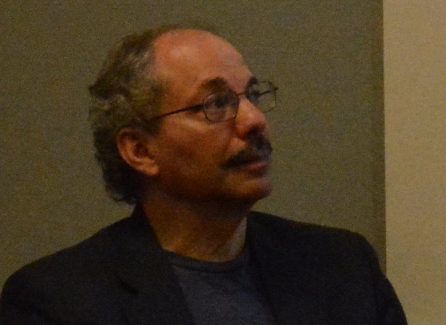By John Vito d’Antonio-Bertagnolli & Amy Ng
Few members of the NJIT community can claim a forty-year association with the institution. One of few faculty members with such tenure is Dr. Richard Sher, of the Federated History department, who taught a course as an adjunct professor in 1975, forty years ago, and the same year that the Newark College of Engineering became NJIT. The epitome of a classical professor, Sher rose from the ranks of an adjunct to his current position as Distinguished Professor in the Federated History Department, all while writing volumes on the Scottish Enlightenment, involving himself in some of the largest administrative decisions this school has ever made, and playing racquetball.
Sher began his studies as a philosophy undergraduate. Continuing to the University of Chicago, he earned an interdisciplinary Master’s degree, before completing a Ph.D. in modern European cultural, social, and intellectual history. An advocate for liberal arts majors, who often fall under scrutiny in today’s vocationally-driven collegiate environment, Sher maintains “when you major in the Liberal Arts, it’s a different kind of thing. Instead of looking at it as if there’s no particular direction, you should look at it as if you can go in any direction.” He’s quite right. More and more increasingly, typically technologically-driven industries are seeking people with liberal arts backgrounds to round out their STEM-based employee teams. Management and administrative positions are another group of fields in which liberal arts students typically excel.
Sher himself has demonstrated a knack for administrative work during his tenure at NJIT, involving himself in some of the largest changes that the institution has seen. In 1985, Sher assumed the role of the Director of the Honors Program, which grew from an initial class of 28 students to over 160 at his succession in 1990. President Bloom, the first Dean of the Honors College, “always did refer to [him] as the person who started it all.” Sher also acted as the primary founder of creating the Federated History Department with Rutgers-Newark, one of two federated programs at between the two schools. “If I had my way,” he says, “the universities would be totally federated. There would be no barrier at all across Martin Luther King Boulevard. It gives the students a tremendous number of resources that otherwise wouldn’t be available.”
Speaking of MLK Boulevard, Sher recalled the namesake of the school’s athletic program. Not many students, or new faculty members, know where the name “Highlanders” comes from. In fact, it refers to NJIT’s former address, on High Street, which was later renamed MLK Boulevard. Hence, the NJIT mascot is the Highlander, a tidbit that Sher recalls from the 1970s.
Dr. Sher’s most recent accomplishment is, of course, the Shared Governance initiative, which went into effect last year. He “wasn’t the founder, as far as the idea was concerned, that came down from above.” Still, Sher chaired a steering committee brought about the documents to found the University and Faculty Senate, so much of the ground work relied on his guidance and leadership. He spent much of 2012 and 2013 working on these documents, and assumed the role of President of the Faculty Senate just a few weeks ago, on September 1st.
Sher is not teaching this semester; instead, he is focusing on his role as Faculty Senate President, as well as rewriting the Faculty Handbook. Normally, though, he does teach at both the undergraduate and graduate levels, his resume boasting classes such as Technology and Society in European and World History, and Communications through the Ages. His research, however, focuses on 18th-century Scotland, where he travels almost once a year with his wife, who retired from the History Department faculty in 2007. His volumes on the subject have been translated to Chinese, and led to a position as a founding member of the Eighteenth-Century Scottish Studies Society. Sher is planning a sabbatical next year, which may very well take him to Scotland again, to work on yet another book.
On his time at NJIT, Sher had this to say: “I’ve been at NJIT my whole career. I’ve really enjoyed it, I like seeing how it’s developed and how it’s improved over the years. I’m proud of the fact that I’ve made these administrative contributions, Honors, the Federation, and Shared Governance in particular.” Dr. Sher may not be known to many students outside the history department, but his mark on the NJIT community is certainly indelible.
Do you have a favorite faculty member? Email [email protected] or [email protected] the name of the professor you would like to see interviewed by the Vector.































